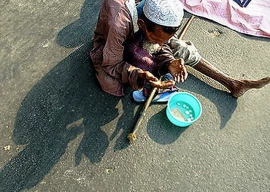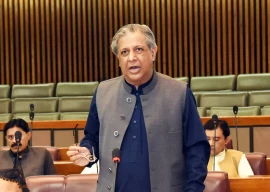
MUMBAI: A trio of "indie Hindi" films are bringing a new Indian cinema to the Cannes Film Festival, where Bollywood stars like to spice up the red carpet but their movies seldom create a serious buzz.
Dealing with corruption and coal mafias, impotency and the porn industry, the films in this year's line-up are part of a burgeoning, alternative Bollywood that departs from commercial song-and-dance hits so popular at home.
"Indian cinema is coming of age. We are ready to interact with filmmakers from across the world," said Anurag Kashyap, who has a hand in two of the productions showing at Cannes.
Kashyap directed the longest-running entry in the festival, "Gangs of Wasseypur", a five hour and 20 minute film he describes as "a Bollywood-influenced gangster epic, part Western, part documentary."
With a folk-meets-dubstep soundtrack and a basis in true stories, the film follows three generations of coal and scrap-trade mafia gangs in a suburb in east India who are obsessed with traditional Hindi cinema.
"These people grow up wanting to be gangsters, they don't go to school or colleges, they watch Bollywood," he told AFP. "Everyone has a false sense of film screen heroism that they follow."
Over coffee and roll-up cigarettes at his Mumbai apartment, Kashyap confessed he was "like a zombie" after rushing to finish the two-part film in time for the Directors' Fortnight sidebar section of the Cannes festival.
"But it's been fun making this film and the good thing is the fun is translating to other parts of the world," he said.
He is also excited about the experimental "Peddlers", backed by his Anurag Kashyap Films production house, which is running in the other main sidebar section at Cannes, Critics' Week.
Directed by newcomer Vasan Bala and financed through appeals on Facebook, the Mumbai-based movie "takes on subject matters which are normal and everywhere but still considered taboo in cinema," Kashyap said.
"Like a man dealing with his own impotency, and how it brings out the violence in him, and quite fearlessly the camera just lingers on, watches these lives, almost like a voyeur."
After blazing a trail for two decades in the industry, Kashyap is a reluctant producer. He sees himself as a director at heart and says he only set up his production house so he could make his own kind of films.
"That company has become a monster of its own. It's a good monster," he laughed. The group aims to "find these new voices and independent filmmakers and be their support system."
Kashyap believes the role of social networking will grow in funding future indie productions by appealing to Indian cinephiles who want something other than the typical action-packed, romantic, comedy musical.
"Mainstream Bollywood has always been there and it caters to people who need it, but the other kind of cinema is almost absent," he said.
The mainstream itself is starting to grapple with broader content, but the fact it operates in a movie-mad country of 1.2 billion people could be to blame for the slow pace of change.
"Our strength is that we don't need to sell one ticket to a non-Indian, world over, to sustain ourselves, and that's also our weakness, because it's precisely the reason that we don't grow," said Kashyap.
His thoughts were echoed by Ashim Ahluwalia, director of "Miss Lovely", the third Indian film screening at Cannes in the "Un Certain Regard" part of the main competition, which showcases new talent.
"I would love to see more individuality, more unique films. And for sure, less 'stars' and less predictability," he told AFP in an email from Berlin, where he is doing post-production on the film.
Like Kashyap, Ahluwalia distances himself from traditional Bollywood but has a fascination with elements of Indian cinema: his "very gritty and dark" film depicts the sleazy world of 1980s "C" grade Hindi movies.
"I was interested in the lower depths of the industry, people who make cheap films on the margins – sex horror films, bandit films," he said.
India's presence at Cannes is generating high expectations: "2012 could be the beginning of a new romance between film festivals and Hindi cinema," said a column in the daily Hindustan Times.
Kashyap, who is working with British "Slumdog Millionaire" director Danny Boyle on a film about 1960s Mumbai, hopes the exposure can help to change perceptions of Indian cinema and boost ties with foreign filmmakers.
"When our films have been travelling to various festivals there have been some incredible eye-opening experiences with the audiences, the way they look at us and the way they are surprised with what we're doing," he said.



























































COMMENTS
Comments are moderated and generally will be posted if they are on-topic and not abusive.
For more information, please see our Comments FAQ